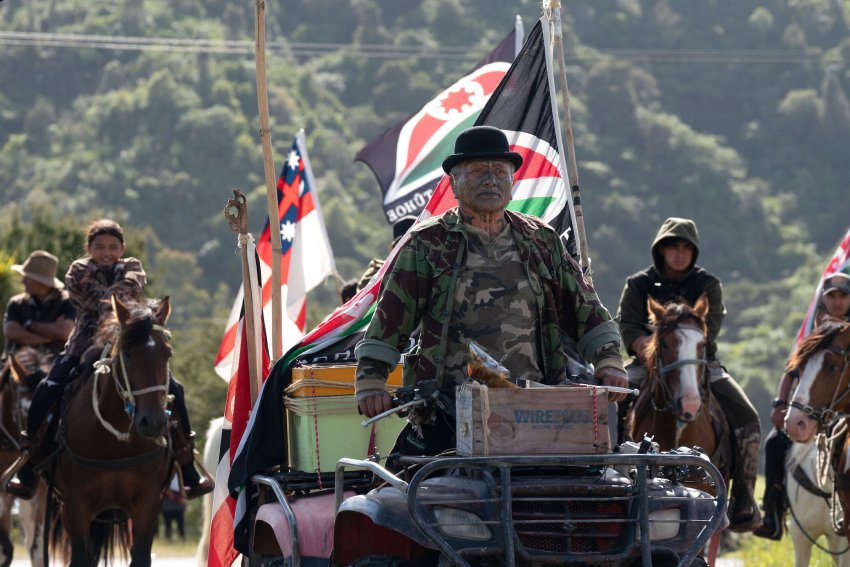
Muru
Directed by Tearepa Kahi
Starring Tame Iti, Cliff Curtis, Jay Ryan, Manu Bennett
In Māori with English sub-titles
In cinemas
Muru is presented as a “response” to real events. It is not an exact replica, but communicates the sensations of a community under violent, racist attack.
As lead actor Tame Iti and writer/director Tearepa Kahi explained to Green Left, the Rūātoki valley Tūhoe hapū community was attacked by government forces in 1916 and again by anti-terrorism police in 2007. The film dramatises the 2007 events but contextualises it within the earlier assault.
Muru is an exciting roller coaster ride that takes the audience through the Māori experience and unflinchingly exposes racism.
“The point of the film,” Kahi said, “is to ensure the protection of Māori communities and the Tūhoe community against this event ever happening again. Two times is too many. That’s why it’s a response, rather than a recreation”.
The film opens up broader issues that Kahi and Iti shared with GL.
The film shows the 2007 raid by hundreds of members of the Armed Offenders Squad and Special Tactics Group. The police were convinced that well-known activist, Tame Iti (who plays himself in the film) was operating paramilitary training camps in the mountains around Rūātoki.
Having convinced themselves that evil was afoot, everything done by community members was fitted into the narrative. It was racist projection.
Iti was targeted because he was a renowned warrior for the Māori cause and a veteran of both the anti-Vietnam War and anti-Apartheid movements, which included some fierce street battles in Aotearoa New Zealand.
Muru shows the peaceable valley life being lived while the raid is being hatched in secret. In the whole film there are only a couple of sentences spoken in English.
The viewer is taken through the mutually-supporting, honour-based reciprocal relationships holding the community together. These complex ties are indecipherable for the cops spying with microphones, telephone tapping and video surveillance.
Local community police sergeant, "Taffy" Tawharau (Cliff Curtis), drives the school bus and takes the local Aunties to their regular health check-ups.
When he has to intervene to set a delinquent teenager back on the straight-and-narrow, he listens to the wisdom of community elders before taking action. The depiction of the role of the community police in Rūātoki was accurate, Iti told GL.
Just as happened in the 2007 raid, in Muru, Taffy is kept in the dark about the raid and the drama centres around his efforts to stop the evolving disaster. Racist preconceptions compound official failures, leading to an attempted cover-up culminating in a fierce struggle to control the violence.
Iti told GL that Muru has had huge impact. “The street is talking,” he said. “Emotionally, people are talking freely.”
“People I don’t even know, on the street, they come and reach out to me. All kinds of people, they cry in front of me. I don’t know how many times I’ve had to hug people.”
Both Iti and Kahi believe that New Zealand is ready for change. For a start the nation is ready to change its name to Aotearoa.
Kahi explained that the government at one point “rebranded” the country as “Middle Earth” after the country was used as the picturesque backdrop for the Peter Jackson Lord of the Rings films.
“The Middle Earthing of New Zealand was a commercial, touristic, exploitation exercise. The unanchoring of that means that there is a much bigger question to ask now: who are we?”
“Aotearoa speaks and Aotearoa is what we are ready for.”
[Watch the trailer for Muru here.]